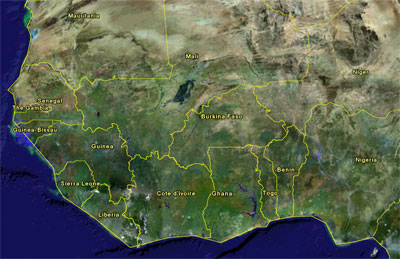GHANA
Please note, this page is not longer being updated. For more recent information, please see news.mongabay.com and use the search function to find the country feed. For more up-to-date data on forest cover and loss, check out Global Forest Watch.
| Ghana Forest Figures
Forest Cover Total forest area: 5,517,000 ha % of land area: 24.2% Primary forest cover: 353,000 ha % of land area: 1.5% % total forest area: 6.4% Deforestation Rates, 2000-2005 Annual change in forest cover: -115,400 ha Annual deforestation rate: -2.0% Change in defor. rate since '90s: 4.2% Total forest loss since 1990: -1,931,000 ha Total forest loss since 1990:-25.9% Primary or "Old-growth" forests Annual loss of primary forests: n/a Annual deforestation rate: n/a Change in deforestation rate since '90s: n/a Primary forest loss since 1990: n/a Primary forest loss since 1990:0.0% Forest Classification Public: 100% Private: 0% Other: 0% Use Production: 22.7% Protection: 6.4% Conservation: 0.8% Social services: 1.2% Multiple purpose: n/a None or unknown: 68.9 Forest Area Breakdown Total area: 5,517,000 ha Primary: 353,000 ha Modified natural: 5,004,000 ha Semi-natural: n/a Production plantation: 160,000 ha Production plantation: n/a Plantations Plantations, 2005: 160,000 ha % of total forest cover: 2.9% Annual change rate (00-05): 20,000,000 ha Carbon storage Above-ground biomass: 726 M t Below-ground biomass: 267 M t Area annually affected by Fire: n/a Insects: n/a Diseases: n/a Number of tree species in IUCN red list Number of native tree species: 680 Critically endangered: 3 Endangered: 19 Vulnerable: 94 Wood removal 2005 Industrial roundwood: 1,205,000 m3 o.b. Wood fuel: 28,253,000 m3 o.b. Value of forest products, 2005 Industrial roundwood: $31,265,000 Wood fuel: n/a Non-wood forest products (NWFPs): n/a Total Value: $31,265,000 More forest statistics for Ghana |
Subsistence agriculture and cutting for fuelwood is common throughout Ghana and worsening due to a population growth rate approaching 3 percent. Logging and the pursuit of gold have also proved costly to the country's natural areas.
Forest loss in Ghana has exacerbated droughts and bushfires. In 1997 and 1998, widespread bushfires led the government to step up its anti-bushfire campaign, but the reform had little effect. Desert is encroaching on some deforested lands and soil erosion is rampant. The economic development of Ghana has come at a great cost to its forests and environment.
On a more positive note, Ghana is host to Kakum National Park, which attracts thousands of visitors every year. The park's main draw is its canopy walkway and the forest's diverse array of wildlife, including monkeys, bongos, and forest elephants. Kakum is one of the last isolated fragments of rainforest that once extended across West Africa. In total, about 15 percent of Ghana's land area is under some form of protection, though the government still struggles with enforcement. Despite these difficulties, the government has taken an active role in trying to curb logging. After its 1995 log export ban, the government has actively pushed plantation development projects in degraded forest lands to reduce the pressure on natural forests. The efforts yielded a 44 percent decline in log exports between 1994 and 1997.
According to data from the World Resources Institute, Ghana has 3,725 species of plants, 729 birds, 222 mammals, 131 reptiles, and 90 fish.
Recent articles
Forest protection could earn tens of millions for Ghana -- 11/06/2006
Ghana could earn tens of millions of dollars for reducing its deforestation rate under a carbon-trading initiative proposed by a coalition of developing countries and under discussion this week at U.N. climate talks in Nairobi, Kenya.
Recent articles | Ghana news updates | XML
Suggested reading - Books
- Bradt Travel Guide to Ghana
- Map of Ghana
- The Impact of Climate Change on Drylands : With a focus on West Africa
Unless otherwise specified, this article was written by Rhett A. Butler [Bibliographic citation for this page]
Other resources
Contact me if you have suggestions on other rainforest-related environmental sites and resources for this country.

Image copyright Google Earth, MDA EarthSet, DigitalGlobe 2005
CIA-World Factbook Profile
FAO-Forestry Profile
World Resources Institute
Last updated: 4 Feb 2006
